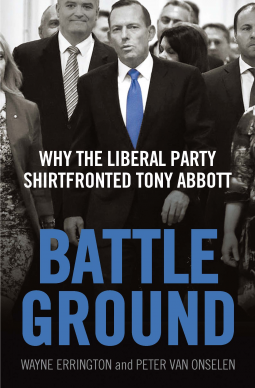
Battleground
Why the Liberal Party Shirtfronted Tony Abbott
by Wayne Errington & Peter Van Onselen
This title was previously available on NetGalley and is now archived.
Send NetGalley books directly to your Kindle or Kindle app
1
To read on a Kindle or Kindle app, please add kindle@netgalley.com as an approved email address to receive files in your Amazon account. Click here for step-by-step instructions.
2
Also find your Kindle email address within your Amazon account, and enter it here.
Pub Date Nov 18 2015 | Archive Date Jul 19 2016
Description
Tony Abbott came to office lauded as the most effective leader of the opposition since Whitlam, but the signs of an imperfect transition to the prime ministership would soon emerge. Why did Abbott fail to grow into the job to which he had aspired for decades? Backbenchers complained about the leader's office, the lack of access, front benchers leaked cabinet processes to the media. His long apprenticeship in religion, journalism and political life prepared him for neither the mundane business of people management nor the commanding heights of national leadership. Public goodwill evaporated after a tough first budget the government failed to explain. Inside the Liberal party individual ambitions and a succession of poor polls produced increasing concern that the next election was lost. As a result, the horse named self-interest won yet again.
Peter van Onselen is an Australian academic, author and political journalist. He is the Contributing Editor at The Australian newspaper and a presenter at Sky News. He holds the Chair of Journalism at the University of Western Australia.
Wayne Errington is the author of numerous books and articles about Australian politics. He is senior lecturer in politics at the University of Adelaide.
Available Editions
| EDITION | Paperback |
| ISBN | 9780522869712 |
| PRICE | A$29.99 (AUD) |
Average rating from 4 members
Featured Reviews
‘It was Abbott’s failure to recognise and seek to rectify his own leadership flaws that saw him ousted.’
In this book, published just two months after the event, Wayne Errington and Peter van Onselen look at why Tony Abbott lost the prime ministership to Malcolm Turnbull. Why did the man who was arguably one of the most effective leaders of the opposition in the last forty years fail to make the transition to effective leadership? What went wrong?
Having watched the performance of the government under Tony Abbott, I wondered whether Tony Abbott ever realised that while being elected to lead the government signifies the end of a particular ‘race’ it is only the beginning of the process of governing. I wonder, too, whether he realised that the election was lost by Labor rather than won by the Coalition.
As portrayed in this book, Tony Abbott seemed out of step, somewhat anachronistic. Yet, he displayed loyalty to colleagues which surely was sometimes misplaced. He seemed unable to change course when a different approach might have delivered better outcomes, and made ‘captain’s picks’ which had at least some of us questioning his judgement.
‘Because Abbott had always been able to rely on Howard for preferment, he had built no base of support in the party to fall back on.’
But this book is not an in depth analysis of the Abbott government, it’s an analysis of the factors that caused the Liberal Party to replace Tony Abbott with Malcolm Turnbull. It’s an interesting read, a case study in the causes and effects of ineffective leadership. The role of the Prime Minister’s Office receives a lot of attention, as does the use of particular elements of the media. Clearly, Tony Abbott did not learn much from his ‘near-death experience’ in February 2015. If he had, I doubt that the Liberal Party would have removed him as leader.
For those interested in Australian political leadership, this book is well worth reading. Many of the issues that bedevilled Tony Abbott’s prime ministership: communication, leadership and management are issues for every effective leader.
‘We are going to keep the promise that we actually made, not the promise that some people thought that we made or the promise that some people might have liked us to make.’
Note: My thanks to NetGalley and Melbourne University Publishing for the opportunity to read this book.
Jennifer Cameron-Smith
Readers who liked this book also liked:
M. K. Oliver
General Fiction (Adult), Humor & Satire, Mystery & Thrillers
Laura McCluskey
General Fiction (Adult), Mystery & Thrillers











